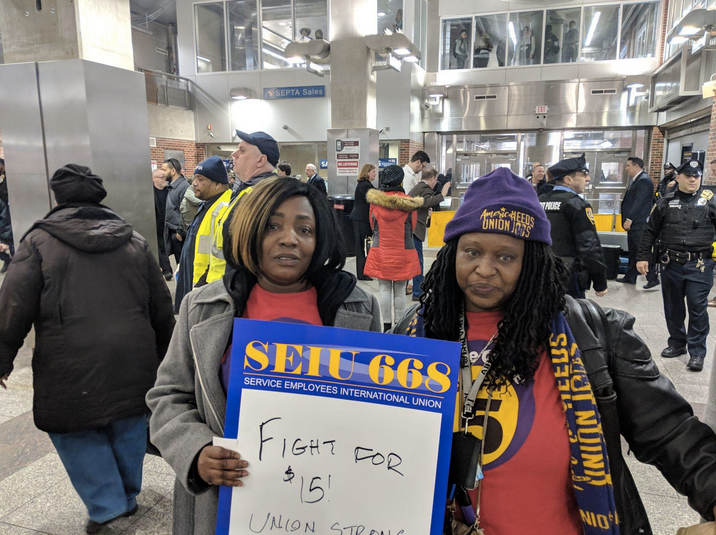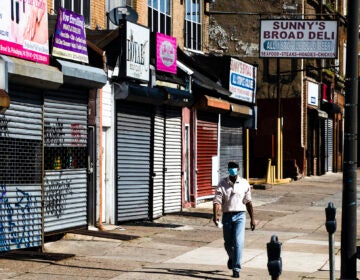It’s not enough to talk about ‘career pathways’
The minimum wage has been the same since 2009. Gov. Tom Wolf and his fellow Democrats want to more than double it. Though it looks like they are willing to settle for less.

Home healthcare workers Stephanie Williams, (left), and Lolita Owens rally at the Frankford Transportation Center in February to pressure state lawmakers to increase the state minimum wage to $15 an hour. (Michael D’Onofrio/The Philadelphia Tribune)
This article originally appeared on The Philadelphia Tribune.
—
State legislators are back in session and they are again talking about raising the minimum wage.
The minimum wage — $7.25 per hour — has been the same since 2009.
Gov. Tom Wolf and his fellow Democrats want to more than double it — to $15 per hour, if the “Fight for $15” campaign is any indication.
Though it looks like they are willing to settle for less.
In January, Wolf proposed raising the minimum wage about 65% to $12 per hour; Republicans shot that down. GOP leaders said they would consider a more modest increase, but they haven’t said what they think an appropriate number is.
House Majority Leader Brian Cutler (R-Lancaster) told TheAssociated Press last week that he’d “rather focus on the jobs that pay far more than minimum wage and get career pathways to get individuals earning a lot more” than worry about the minimum wage.
And while that sounds good, it’s not the reality of the state we live in.
The economy is not an either-or proposition.
It’s not minimum wage jobs or high-wage jobs.
It’s both. And more.
Certainly, there are people in poverty — or just barely above it — who need a good quality education to help them climb out. And we support any efforts to improve all levels of education.
But not everyone wants to have those higher-paying jobs Cutler talked about. And not everyone is able to do those jobs.
At the same time, we will always need people to deliver goods to stores or customers, stock store shelves, help customers find things in stores, scan goods at cash registers, mix coffee drinks at cafes or alcoholic drinks at bars, cook hamburgers, clean bathrooms and hallways and offices, take out trash, handle luggage at airports and more. And the people who work long, often labor-intensive hours at those jobs need to earn enough to support themselves and their families.
As it is, they can’t do that. At least not in Philadelphia.
The average monthly rent for a one-bedroom apartment in Philadelphia is $1,350 and the average monthly rent for a two-bedroom apartment is $1,700, according to Zumper, a company that lists available rentals and tracks rates across the country. That’s more than a person who earns minimum wage takes home in a month.
A pair of people who each earn minimum wage would pay 62% of their combined income for a one-bedroom apartment at the average rate and 78% of their combined income for a two-bedroom apartment.
Renters can find apartments for about $800 per month in some neighborhoods of the city. Even those low (for Philadelphia) rates represent roughly 73% of a minimum-wage earning individual’s net monthly pay. Someone who earns minimum wage has to work more than 118 hours to be able to pay that monthly rent bill. They have to work at least four hours to fill their cars with gas or buy a weekly SEPTA TransPass so they can get to work, and another hour to be able to buy a gallon of milk and a loaf of bread. And then they have to figure out how to pay all of their other bills and still eat a few meals every day.
That’s why many people who earn minimum wage often work two or three jobs.
There are also many people who have college degrees and earn salaries well above the poverty level who have a hard time finding a place where they can afford to live. They earn too much to qualify for low-income housing, and too little to pay rent in many apartments in the city.
Yes, lawmakers have to talk about education.
But lawmakers also have to talk about the minimum wage.
And they have to talk about where the jobs are and the cost of living where the jobs are.
Lawmakers cannot neglect one topic in favor of another. Creating “career pathways” to higher paying jobs won’t do any good for people who aren’t interested in those jobs, or people who aren’t able to do those jobs, or people who already have those jobs and still can’t afford to pay for basic living expenses.
It’s not either-or.
It’s both-and.
WHYY is your source for fact-based, in-depth journalism and information. As a nonprofit organization, we rely on financial support from readers like you. Please give today.




